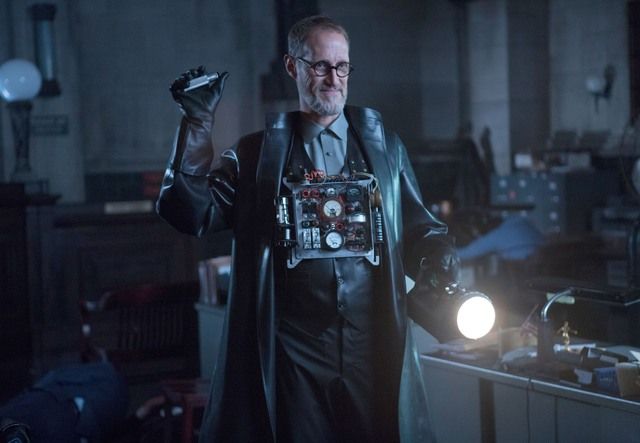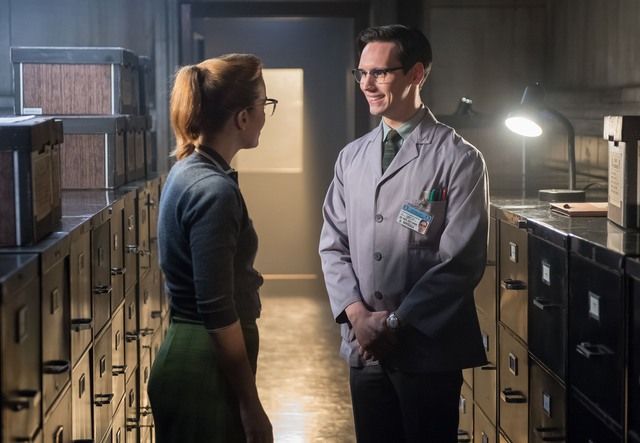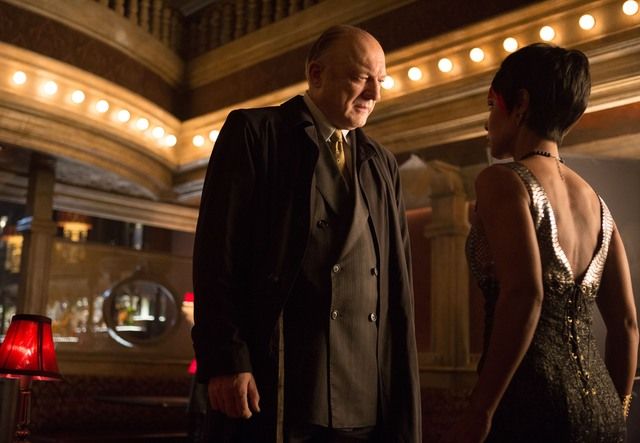Toward the end of this week's episode of Fox's Gotham, newly reinstated Detective Jim Gordon declares, "I'm done being careful." If only the same were true of this show moving forward.
Scripted by series MVP (and notable comic book creator in his own right) Ben Edlund, "What the Little Bird Told Him" is not only the best episode of the series to date, it's also a virtual playbook for the ways Gotham could extend its life as a solid Batman prequel. As the show's twin plotlines (following the city's police force and criminal underworld) rubbed shoulders without colliding, the friction of the episode sparked some refreshingly weird comic book moments.
That all starts with the Electrocutioner. The escaped Arkham Asylum inmate also known as Jack Gruber waltzes into the story to the tune of Johnny Cash's "God's Gonna Cut You Down," and even the obviousness of the soundtrack doesn't detract too much from the genuine oddity the villain is.
Armed with an arsenal of car-battery torture devices and the lobotomized muscle called Aaron Helzinger (a hat tip to '90s Bat-villain Amygdala), Electrocutioner is the perfect kind of proto-rogue the show needs. He's an afterthought comic villain brought to new life by an angelically professorial performance from Christopher Heyerdahl. The more "close but no cigar" attempts at the Bat's more iconic bad guys we get, the more the show feels as if it's giving us a city on the cusp of vigilante justice. And as Gruber and Helzinger shock their way through the mob-front electrical shop we remember from earlier in the season, the familiarity of the scene allows for just a touch more of the off-kilter cityscape that has been the show's strongest element.
Back at G.C.P.D., the hunt for Gruber is priority No. 1 for the politically connected Commissioner Loeb (Gotham's latest character actor steal in Peter Scolari). The longer the madman runs loose, the more likely it is the river of dirty money that runs from the Asylum to the city's corrupt political class will dry up. Loeb is so desperate for results that he'll even let the department's honest-to-a-fault loose cannon Gordon back on the case ... with a catch: If Gordon and his partner don't deliver in 24 hours, both will be knocked back to Arkham for as long a stay as its jibbering wackjobs.
The contrived setup can be easily forgiven because of the new opportunities this turn presents. With his "there's nothing more you can do to me" attitude, Gordon feels like the kind of righteous crusader the city needs rather than the muddy, conflicted wannabe we've seen in weeks past. Even better, the blithe way Gordon drags Harvey Bullock forward toward his windmill offers up a whole second emotion for lead actor Ben McKenzie to portray on screen. (Goodbye, teeth-gritting anger! Hello, awkward sarcastic smile!)
But the episode's biggest weak spot is one that remains a troubling problem for Gotham as a whole: For a police procedural, the procedure here is an eternal afterthought. Once Gordon strongarms his way onto the case, all his breaks fall right into his lap. A sloppy homicide gives the detectives their first clue, and an ultra-convenient visit from doe-eyed Dr. Leslie Thompkins delivers the motivation for the killing spree and a great opportunity to wrap things up as quickly as possible. Thompkins' discovery of Gruber's Arkham voodoo doll leads Gordon to the Electrocutioner's next victim by a longshot resemblance (because Gordon is apparently never wrong with a cheap guess). The only moments of legit police work that seems to be accomplished at G.C.P.D. comes courtesy of Basil Exposition himself, Eddie Nygma.
Although for his part, the usually ingratiating future Riddler got a tad more shading this week as Edlund returned to a plotline that hadn't been touched since the last time he scripted. Eddie's crush on precinct file clerk Miss Kringle remains creepy and overbearing as the future villain bombards her with cryptic mash notes. When Nygma seemingly starts to break through to his obsession, perfectly jockish Detective Arnold Flass butts in and seemingly reveals Kringle's true colors as she confides of Eddie, "He is so weird." The storyline swerves just when it should and leaves us wondering whether the writers are trying to shape Nygma into a critique on every truly cringe-worthy "nice guy who wears down the hot chick to find true love" TV trope vomited out by a network. That would be an inspired turn for a show so one-dimensional, but unless Edlund starts scripting every episode Aaron Sorkin-style (oh please, oh please), we won't see resolution for a while.
Speaking of resolution: The long-simmering war for the Falcone crime family came to a head in mostly strong form this week. Starting with a flashback that made us actually wonder if Don Falcone is sexually excited by women who remind him of sitting on his mama's lap at his daddy's funeral, the story held our interest with complicated turns. As Fish Mooney finally calls in the "innocent" young Liza that she planted in Falcone's heart, the big boss' regret feels real. Not only does Falcone seem defeated that his longtime capo has gone to the mattresses so sharply, his admission to his pet psycho Mr. Zsasz that he's expected this all along opens a door for a twist on the bloody mob power struggle.
Too bad that mafia double agent The Penguin knows the truth about Fish's ruse. However, as if the narrator from Adam West's Batman popped in to say "Uh oh," the wobbling turncoat gets caught up in Electrocutioner's second big hit before he can tip off Falcone. The show's greatly inconsistent use of an electrical attack's effect on the brain (seemingly taking whatever shape the plot needs to move on quickly) sees Penguin blurt out his double-agent status to his day boss Sal Maroni. But even that contrivance can't detract from the overall drama of seeing our usually cool Oswald Cobblepot get kicked around by fate during his biggest opportunity yet to thrive.
Oh, and in case anyone who's following this show was possibly asking for when we'd get more of Gordon's estranged fiancée Barbara, the resident statuesque letdown did receive one scene of plot development this go-round: Arriving at her parents' stately house for a round of extra-WASPy "Everything's fine except I'm about to break down crying" non-confronation, Babs remains an unsympathetic doormat.
In the end, even that dead weight couldn't drag the episode down from the effect of its dueling endings. At the precinct house, Gordon's scheme to hold Maroni as bait draws out the Electrocutioner exactly as planned, but it's the detective's dispatching of the villain with a cup of water that provides a suitably silly end to the whole affair. When Gotham leans into its ridiculousness, it's all the better for it. On the other side of town, the Penguin's 11th-hour intervention puts Falcone one up on Fish, and the boss lets out his anger at her double-cross by strangling poor Liza in front of everyone. Such a moment should have been played with more horror than Gotham is capable of delivering, but the idea that Falcone is now ready to assume his role as true mafia monster is a great opportunity to move the show forward.
Between that, Electrocutioner's model villain and Gordon's take-charge attitude (extending to some sparks of his own with Dr. Thompkins), this episode had plenty of arguments in favor of Gotham earning its second season with a more drastic and dangerous prequel vibe. In a way, this episode felt more like the midseason finale than the one from last year that delivered a shocking new Arkham status quo that lasted all of one week. But whatever format the show pushes on in, let's all hope that the rest of the writing team absorbs Edlund's crafty comic book zaniness as soon as humanly possible.




